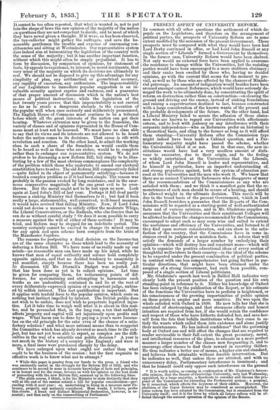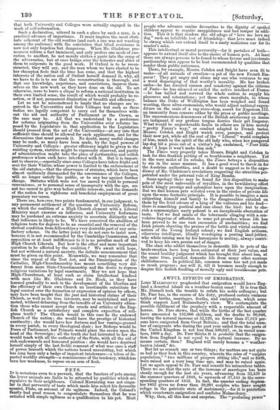PRESENT ASPECT OF UNIVERSITY REFORM.
IN common with all other questions the settlement of which de- pends on the Legislature, and therefore on the arrangement of political parties, the prospects of University Reform are to some extent modified by the accession of the present Government. These prospects must be compared with what they would have been had i
Lord Derby continued in office, or had Lord John Russell or any single section of " Liberals " formed a Government by themselves. In the former case, University Reform would have been shelved. Not only would no external force have been applied to overcome the resistance to change within the Universities, but the resisting parties would have been encouraged to a more stubborn obstinacy ; and their ranks been swelled by those who, having no decided opinions, go with the current that seems for the moment to pre- vail, as well as by those who are affected by the chances of Miniate- rial patronage. An amount of indignation would besides have been aroused amongst earnest Reformers, which would have seriously da- maged the work to be ultimately done, by concentrating the spirit of reform on destruction rather than on construction—on clearing the ground and driving out the enemy, instead of sinking foundations and raising a superstructure destined to last, because constructed with a large consideration of the known wants of the present and the probable developments of the future. On the other hand, had a Liberal Ministry failed to secure the adhesion of those states- men who are known to regard our Universities with affectionate esteem, and to look with jealousy on any interference with their corporate independence—who as Reformers prefer an historical to a theoretical basis, and cling to the former as long as it will afford them standing—University Reform after the Commission type might indeed have been made a Cabinet question, and a Par- liamentary majority might have passed the scheme, whether the Universities liked it or not. But in that case, the new in- stitutions would have had a very needless amount of disfa- vour to encounter, due to their origin, and to the feeling so widely entertained at the Universities that the Liberals, of whom Lord John Russell is leader and representative, and he himself in particular, have an imperfect understanding of, and strong prejudices against, both the system of education pur- sued at the Universities and the men who work it. We know that there arc as earnest University Reformers who disapprove of many of the recommendations of the Commissioners as any who are satisfied with them ; and we think it a manifest gain that the re- monstrances of such men should be secure of a hearing, and should be allowed weight in the ultimate decision. This resat will be due to the broad basis of the present Government, "ihich in Lord John Russell furnishes a guarantee that the Reports of the Com- missions will be regarded as a starting-point of well-authenticated facts and of various opinions, and in Mr. Gladstone supplies an assurance that the Universities and their constituent Colleges will be allowed to discuss the changes recommended by the Commissions, encouraged to adopt such as may seem wise and suited to extend the usefulness and efficiency of the Universities, and listened to if they find upon mature consideration, and can show to the satis- faction of the country, that the Commissions have in some in- stances erred in judgment or mistaken facts. A reform that will satisfy the demands of a larger number by embodying their opinions—which will destroy less and construct more—which will seek to organize the positive educational ideas of every section of thoughtful wellwishers to their country—is the ideal of the scheme to be expected under the present combination of political parties, in contrast with one less comprehensive but going farther in par- ticular directions, that might have been obtained under the auspices of a strong Government, had such been possible, com- posed of a single section of Liberal ppoliticians.i
Mr. Gladstone's speech last week in Balliol Hall indicates very clearly both the present position of the question and his own standing-point in reference to it. Either his knowledge of Oxford has been enlarged by the publication of the Report, or his estimate of the functions the Universities have to perform is heightened, or his consciousness of the growing importunities of public opinion on these points is ampler and more sensitive. He was upon the whole satisfied with Oxford in 1850. He now tells her that she is convicted of shortcomings, and that strenuous efforts and honest intention are required from her, if she would retain the confidence and respect of those who have hitherto defended her, and save her- self from the fate that befalls institutions when they cease to sa- tisfy the wants which called them into existence and alone justify their maintenance. He has indeed confidence* that the governing body at Oxford can and will effect the changes that are required to render serviceable to their full extent the great pecuniary, moral, and intellectual resources of the place, to educate in a more perfect manner a larger number of the classes now frequenting it, and to encourage other classes to find their reward in resorting thither. He thus indicates a better use of means, a higher aim and standard, and believes both attainable without forcible intervention. But he indicates as well, that unless these are attained, and with no unnecessary delay, Parliamentary interference is imminent; and that he himself could only oppose such interference on the ground
* It is worth notice, as coming in confirmation of Mr. Gladstone's favour- able opinion, that the Senate of Cambridge University, only last Wednesday, appointed, by a large majority, a Syndicate to consider and discuss the pro- posal of the Commission for extending the Professorial system; a proposal, be it remarked, which affects the keystone of their edifice. Moreover, the abolition of the Caput Senatus may be considered as accomplished. 'The latter reform has been adopted by the Commission, but it emanated from the University itself ; and it is the lever by which all future reform will be af- fected through the natural operation of the opinion of the Senate.
that both University and Colleges were actually engaged in the work of self-reformation.
Such a declaration, uttered in such a place by such a man, is a practical advance of importance. It must impress the most obsti- nate adherent of the old routine (and such a one was not wanting among the audience) with the conviction that blind resistance is now not only hopeless but dangerous. When Mr. Gladstone pro- nounces reform a fact imminent, and only prefers one mode of exe- cution to another, he not merely strikes a panic into the camp of the adversaries, but at once brings over the honester and abler of them to cooperate in the good work. If Oxford is to be recon- structed, they will say, and the man whom we have elected to be her champion feels that the time has come, and that the highest interests of the nation and of Oxford herself demand it, why, all we have to do is to see that the reconstruction is thorough, and that our knowledge, experience, and convictions, impress them- selves on the new work as they have done on the old. To act otherwise, were to leave a clique to reform a national institution in their own limited sense, the result of which would probably be re- action, or if not, permanent diminution of breadth and efficiency. let us not be misconstrued to imply that no changes are re- quired in the Universities and their Colleges but such as these bodies are legally competent to carry out for themselves with- out the aid and authority of Parliament or the Crown, as the ease may be. All that we understand by a preference for reforms originating from the Universities over reforms im- posed by the Legislature is, that application to the Legislature should proceed from the act of the Universities—at any rate that sufficient time should be allowed for such application, and for the discussions that must precede it. No doubt, many useful changes may be made, as many have been made, by the legal powers of University and Colleges : greater efficiency might be given to the existing system, statutes might be rigorously observed, and purity of administration might take the place of partisanship and selfish preferences where such have interfered with it. But it is import- ant to observe,—especially since some Colleges have taken fright and sent for their Visitor, whose power is limited to the enforcement of the old statutes,—that the observance of statutes, which have been almost uniformly disregarded for the convenience of the Colleges, will no longer satisfy the public, or be any bar against further change. Statutes which were not too sacred to yield to personal eonvenienee, or to personal sense of incongruity with the age, are not too sacred to give way before public interests, and the demands of the nation for a righteous and beneficial employment of great pecuniary rerairces. There are, however, two points fundamental, in our judgment, to -any permanent settlement of the question of University Reform, on which the coalition of a High Church element with a Liberal Ministry must exercise an influence, and University Reformers may be pardoned an extreme anxiety to ascertain distinctly what that influence is likely to be. We have conceived the abolition of religious tests for degrees to be an essential and the removal of the clerical condition from fellowships a very desirable part of any satis- factory scheme. On the latter point we do not care to insist now, because it is not recommended by the Cambridge Commission, and opposition or at least indifference to it is no peculiar mark of the High Ohurch Liberals. But how is the other and more important -question to be affected by the coalition P We await with hope, but not without a natural anxiety, the definite announcement that must be given on this point. Meanwhile, we may remember that
-since the repeal of the Test Act, and the Emancipation of the Catholics, High-Churehmanship has meant something very dif- ferent from mere State-Churchmanship •and the desire to repress religions variations by legal enactments. May we not hope that
High-Churchmen, at least such as -claim intellectual kindred with men like Mr. Gladstone and Dr. Hook, -as they have learned gradually to seek in the development of the liberties and the efficiency of their own Church an inestimable substitute for legal control over the formation or expression of opinion by ethers, may have been taught that the just and historical claims of their Church, as well as its true interests, may be maintained and pro- moted, without debarring from thelenefits of an University educa- tion those who cannot accept the -creeds and articles of the Eng- lish Church as a satisfactory and complete exposition of reli- gious truth? The Church would in this case be the endowed Church of the nation ; she would have the prestige of historical continuity ; she would have her fortress and her vantage-ground in every parish, in every theological chair ; her Bishops would be Peers of Parliament, her Primate would place the crown upon the head of the Sovereign ; all the truth she had intrusted to her she would teach with all the authority of the State, with all the aid of rich endowments and honoured position : she would have deprived herself simply of the last feeble remnant of what was once •a staff
of power beneath which the nations bowed unresisting, but -which has long been only a badge of impotent intolerance—a token of de- pad strength—a reminiscence of the tendency, whichhas been her weakness, to repose on an arm of flesh.



























 Previous page
Previous page